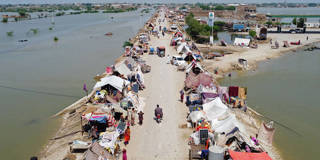With sovereign debt at record levels and extreme weather events becoming more frequent and intense, policymakers must find a way to sustain economic growth, ensure financial stability, and mobilize the necessary resources to combat climate change. Achieving this requires nothing less than a new economic paradigm.
WASHINGTON, DC – Three upcoming international gatherings – the G20 Leaders’ Summit in September, the International Monetary Fund and World Bank annual meetings in October, and the United Nations Climate Change Conference (COP28) in the United Arab Emirates in November – will focus on devising strategies to sustain global growth and tame inflation. With public and private debt at record levels, political leaders face the monumental task of maintaining financial stability while simultaneously allocating resources to address critical challenges such as global warming and pandemic preparation.

WASHINGTON, DC – Three upcoming international gatherings – the G20 Leaders’ Summit in September, the International Monetary Fund and World Bank annual meetings in October, and the United Nations Climate Change Conference (COP28) in the United Arab Emirates in November – will focus on devising strategies to sustain global growth and tame inflation. With public and private debt at record levels, political leaders face the monumental task of maintaining financial stability while simultaneously allocating resources to address critical challenges such as global warming and pandemic preparation.